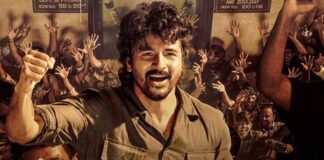But the manner in which the drama ends, one is not even sure if the Muslims (in the drama) lived a more respectable life ever after simply because one Rizvan Khan met the US president. Here, it must be pointed out that Mandira’s outburst, after her son’s murder, that the people in the town where they lived, hated him, post-9/11 (ostensibly because of his last name (Khan)), doesn’t appeal because she knows that he is no terrorist. And, therefore, while Rizvan takes her every word as the truth, the audience still remains unconvinced.It is not just Mandira’s violent rush of emotions in front of Rizvan after her son’s death that is unconvincing. There are several things sought to be established more through dialogues and less through substantive scenes.
For instance, the television channels announce that the whole of America is waiting to know what Khan wants to tell the president, but the audience doesn’t get to see this convincingly enough, through scenes. The hype looks more media-made than real because of the above reason. Similarly, Sameer’s death appears to the audience to be more a case of bullies going berserk and killing him rather than a case of hate crime because he is a Muslim. Yet, the drama that follows would have the audience believe (again, merely because of the dialogues) that Sameer was murdered because he was a Muslim. What’s even more noteworthy is that Sameer’s friend, Reese Garrick, who actually believed him to be a terrorist, had tried his level best to save Sameer from the bullies.
The journey of Rizvan is too long and boring to interest the audience. His deeds in the flood-ravaged Wilhemina do show his humane side but they don’t strike an emotional chord, probably because it is an alien land for the Indian audience and also the people being helped are foreigners, not Indians. And frankly, that was never Rizvan’s mission. Therefore, the entire Wilhemina episode is rather boring.
There is so much usage of English in the film that its appeal would be severely restricted as people in smaller centers would not be able to understand the dialogues.
Coming to the staple ingredients of a wholesome entertainer, they are romance, emotions, comedy, drama and action (if it is an action film). Since this is not an action fare, one would expect the other ingredients to be present in good measure. But while emotions fail to touch the heart, the romance between an ‘abnormal’ guy and a single mother will not gladden hearts. There is inherent comedy in Rizvan Khan’s behavior but it evokes laughter at some places only. The drama holds more appeal for the class audience among the Muslim population than for the masses among Muslims and other communities.
When the screenplay has such gaping holes, a point like Mandira referring to her husband as Khan (instead of Rizvan – perhaps, only because the film is titled My Name Is Khan and not My Name Is Rizvan) seems too minor an irritant. Similarly, Mandira actually smiling (!!) (instead of shedding a tear) when the US president offers his condolences on her son’s death (akin to heroic Indian army men being honoured posthumously at the hands of the president of India – do the widows smile on receiving the award of honour or shed tears?) looks ridiculous, to say the least, but that won’t really change the fate of the film!















